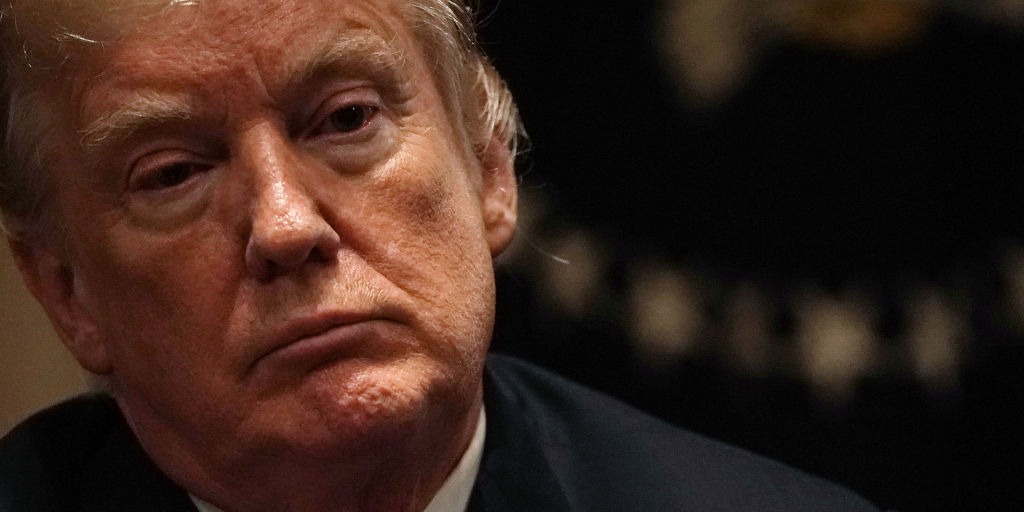- President Donald Trump’s lawyers are reportedly considering agreeing to an interview with special counsel Robert Mueller.
- But only if he meets one of two conditions.
- Either Mueller must agree that he will wrap up the portions of the Russia probe specific to Trump within a set time period – like 60 days.
- Or he must agree he will limit the scope of questioning to a narrow set of inquiries.
- Legal experts said Mueller is unlikely to agree to either and holds more leverage over Trump than Trump does over him.
Sign up for the latest Russia investigation updates here.
President Donald Trump’s legal team is considering proposing a deal to the special counsel Robert Mueller, which would allow him to interview their client in exchange for agreeing to wrap up the Trump-related thread of the Russia investigation, The Wall Street Journal reported Friday.
Trump’s lawyers have been in talks with Mueller’s team about a possible interview for the last few months, but they have largely angled to avoid a face-to-face interview between the special counsel and a president who has been known to exaggerate the truth and make misleading claims.
Now, Trump’s lawyers are reportedly more open to allowing Mueller to question Trump, as long as he pledges that the portions of the Russia probe related to Trump will conclude within 60 days, The Journal reported. Another option they’ve floated is to submit to an interview as long as prosecutors agree to stick to a limited scope of questioning.
Trump is a focus in both the obstruction-of-justice and collusion threads of the Russia inquiry. Specifically, the special counsel is probing whether Trump sought to obstruct justice when he fired FBI director James Comey last May. The White House initially said Comey was fired because of the way he handled the investigation into Hillary Clinton's use of a private server when she was secretary of state. But Trump later told NBC's Lester Holt that "this Russia thing" was a factor in his decision.
Mueller has also sharpened his focus in recent weeks on Russia's hack of the Democratic National Committee and subsequent dissemination of stolen emails, and whether Trump had any prior knowledge of it. The revelation indicated that Trump, who until then was a focus of the obstruction inquiry, had also been roped into the collusion probe.
Moreover, Mueller is also examining Trump's role in crafting an initially misleading statement his son, Donald Trump Jr., issued in response to reports that he and senior Trump campaign members met with two Russian lobbyists offering dirt on Clinton at the height of the election.
Trump's lawyers said he had no knowledge of the meeting. But both former campaign adviser Sam Nunberg and former White House chief strategist Steve Bannon have suggested Trump knew more than he let on. Bannon interviewed with Mueller's team last year, and Nunberg testified before a grand jury on Friday.
An unlikely bargain
Legal experts agreed it's unlikely Mueller will agree to either of the conditions Trump's lawyers are said to be considering.
"He may agree to tell the Trump team what will be the areas of questioning, but that's about it," said Alex Whiting, a professor at Harvard Law School and a former federal prosecutor. "The premise of this approach by Trump's lawyers seems to be that they have bargaining leverage because Mueller wants Trump's testimony. But it's more likely the other way around, and Mueller knows it."
Longtime former federal prosecutor Jeffrey Cramer agreed.
"I can't imagine anyone agreeing to a set time to finish the investigation," he said. "What would happen if they went beyond the time limit. Have never heard of that ever being done and there isn't a chance Mueller would or could agree to that condition."
Moreover, experts said Trump's lawyers likely have few options when it comes to avoiding or narrowing the scope of an interview, particularly in the obstruction inquiry, because prosecutors need to establish whether he had "corrupt intent" when he fired Comey.
"The only person who can testify authoritatively to Donald Trump's motives is Donald Trump," said Jens David Ohlin, a vice dean at Cornell Law School and an expert on criminal law.
Cramer said that "at the end of the day, if Mueller is willing to go to the mats," it would be reasonable for him to require an interview with Trump that has no restrictions as far as the scope of questioning. "It's hard to make the argument that Trump is too busy to make time for the interview."
If Trump's lawyers continue contesting the special counsel's interview requests, Mueller can subpoena Trump to testify before a grand jury.
"Trump knows that he could face high political costs if he refuses to testify, asserting his Fifth Amendment privilege," Whiting said. "I don't think Mueller will succumb to the Trump lawyer demands."

